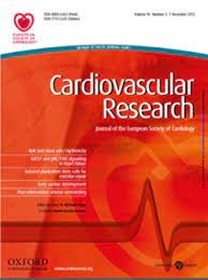酮体对心力衰竭运动不耐受的治疗潜力:超越心脏
IF 10.2
1区 医学
Q1 CARDIAC & CARDIOVASCULAR SYSTEMS
引用次数: 0
摘要
最近的证据表明,酮体在包括心力衰竭(HF)在内的许多心血管疾病中具有治疗潜力。因此,这导致了使用酮酯治疗心衰患者的多个临床试验,我们称之为酮疗法。酮酯,特别是酮单酯,是一种合成化合物,当消耗时,它被脱酯化成两个β-羟基丁酸酯(βOHB)分子,并增加循环βOHB浓度。虽然许多研究主要集中在HF的酮治疗对心脏的益处上,但酮对其他器官如脉管系统和骨骼肌也有许多有利作用。重要的是,血管和骨骼肌功能障碍也与运动耐量降低密切相关,这是HF射血分数降低(HFrEF)和保持(HFpEF)的标志性特征,表明酮治疗对HF的一些益处可能涉及这些非心脏途径。因此,我们回顾了酮治疗如何有助于改善心衰患者心血管和骨骼肌功能的证据,并确定了酮对心衰患者有益的非心脏作用的各种潜在机制。本文章由计算机程序翻译,如有差异,请以英文原文为准。
Therapeutic potential of ketone bodies on exercise intolerance in heart failure: looking beyond the heart
Recent evidence suggests that ketone bodies have therapeutic potential in many cardiovascular diseases including heart failure (HF). Accordingly, this has led to multiple clinical trials that use ketone esters to treat HF patients, which we term ketone therapy. Ketone esters, specifically ketone monoesters, are synthetic compounds which, when consumed, are de-esterified into two β-hydroxybutyrate (βOHB) molecules and increase the circulating βOHB concentration. While many studies have primarily focused on the cardiac benefits of ketone therapy in HF, ketones can have numerous favorable effects in other organs such as the vasculature and skeletal muscle. Importantly, vascular and skeletal muscle dysfunction are also heavily implicated in the reduced exercise tolerance, the hallmark feature in HF with reduced (HFrEF) and preserved (HFpEF) ejection fraction, suggesting that some of the benefits observed in HF in response to ketone therapy may involve these non-cardiac pathways. Thus, we review the evidence suggesting how ketone therapy may be beneficial in improving cardiovascular and skeletal muscle function in HF and identify various potential mechanisms that may be important in the beneficial non-cardiac effects of ketones in HF.
求助全文
通过发布文献求助,成功后即可免费获取论文全文。
去求助
来源期刊

Cardiovascular Research
医学-心血管系统
CiteScore
21.50
自引率
3.70%
发文量
547
审稿时长
1 months
期刊介绍:
Cardiovascular Research
Journal Overview:
International journal of the European Society of Cardiology
Focuses on basic and translational research in cardiology and cardiovascular biology
Aims to enhance insight into cardiovascular disease mechanisms and innovation prospects
Submission Criteria:
Welcomes papers covering molecular, sub-cellular, cellular, organ, and organism levels
Accepts clinical proof-of-concept and translational studies
Manuscripts expected to provide significant contribution to cardiovascular biology and diseases
 求助内容:
求助内容: 应助结果提醒方式:
应助结果提醒方式:


